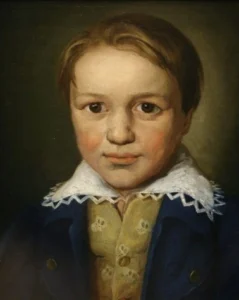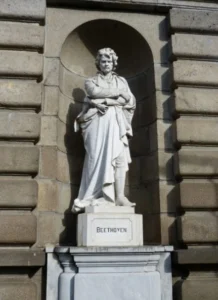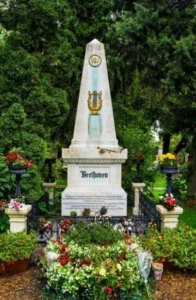Beethoven Biography

“There are moments when it seems to me that language is still of absolutely no use . ” Beethoven wanted, with this famous quote, to highlight a palpitating reality that hits us all equally: the one that has to do with the severe deficiencies of language, capable of interposing abysses between human beings, reducing communication to a conventionalist pre-Aristotelian concept. Or put another way, the signifier can be independent of the signified; the latter, often subject to the purest arbitrariness.
At the beginning of the 19th century, philosophers, musicians and other figures of Enlightenment thought wondered about the universality of music as a language, an idea of which the young Beethoven can be considered an intellectual precursor .
Plagued by illness from his earliest childhood, and faced with latent deafness that isolated him from the world before he was thirty, he managed to overcome adversity, composing some of the fundamental works in the universal history of music, such as the Ninth Symphony .
Calamitous childhood
Ludwig van Beethoven was allegedly born on December 16, 1770 in Bonn, in the Electorate of Cologne of the Holy Roman Empire. And I say presumably because the biographers, although unanimous, have not been able to consult any official birth certificate that proves it.
Contrary to popular belief, his parents had humble origins , since his paternal grandfather, named Ludwig, was a descendant of farmers and peasants who came from Flanders to Bonn in the 18th century.
Beethoven’s father was a fervent enthusiast of Wolfgang Amadeus Mozart, the outstanding composer who delighted the world with his first concerto when he was only 7 years old. His admiration was so great that it became an obsession, martyring his little offspring to follow in the footsteps of his idol; teaching him piano, clarinet and organ against his will. Such submission restricted the child’s emotional development, who cloistered himself in his own thoughts, avoiding the world around him .

They say that, as night fell, when Beethoven was trying to fall asleep in his bed, his father, Johann, gracefully removed the sheets that covered him, forcing him to play the piano for his acquaintances. Violent episodes were frequent, due in part to the incipient alcoholism that had germinated in his father, who even lost a position as conductor of the orchestra in Bonn because of this addiction. The mother, often absent due to illness, constituted the battered Beethoven’s only emotional raft.
November 12, 1767 is set as the date of his first concert, at the age of 7, the same as his classicist counterpart Mozart . Not satisfied with his son’s overwhelming display of talent at the tender age of 7, Johann blatantly lied in his introduction, stating that he was 6 years old, in a show of proving his son’s implausible precocity. . The audience that attended the audition in Cologne was stupefied, which would push Beethoven, now, to support his own vocation.
Given his father’s lack of musical and pedagogical resources, he began to receive private lessons from other teachers, excelling in organ performance and composition, attracting the attention of musicians as talented as Christian Gottlob Neefe, who supervised some of the classes. He would soon become a teacher and mentor, giving Beethoven all the past knowledge of the best ancient and contemporary works into Beethoven’s hands, sculpting his genius with his baton.
At the age of 9, Beethoven published his first composition , Nine Variations on a March by Ernst Christoph Dressler . A year later, Neefe would write in Music Magazine a phrase as resounding as it was premonitory: — “If he continues like this, as he has started, he will surely become a second Wolfgang Amadeus Mozart . ”
The following year, he managed to enter more eclectic circles, doors that were opened for him by Neefe, such as the one that gave him a contract as a viola player in Maximiliano’s orchestra.
Vienna discovers early talent
Tormented by the pressure that his family exerted on him, Beethoven found an escape valve when, in 1787, as a teenager of barely 16 years old, he decided to go to the Austrian capital, Vienna , supported financially and morally by his patron, Count Ferdinand. von Waldstein. During the course of this trip, and always according to legend, since this information has never been verified, he had a fleeting encounter with Mozart, who would assert: — “ Remember his name, this young man will make the world talk.” . Documentary sources are scarce and of dubious veracity, but let us allow ourselves to fantasize about this spatiotemporal coincidence.
Shortly after settling in Vienna, his mother became seriously ill with the insidious tuberculosis, a disease once unmentionable as cancer is today due to her particular clinical condition, which turns the journey to death into an ordeal greater than the very idea of dying. . Faced with this situation, his father asks him by letter to return to Bonn immediately. Finally, he ends up passing away on July 17 of the same year, leaving a brood to care for and feed, a task that Beethoven would take care of.
To support his brothers, Beethoven had to give up his youth, due to the indisposition of his father who, after the sudden death of his wife, saw his alcoholism and behavioral problems worsen, ending up in prison. The latter would die shortly after, on December 18, 1792. Meanwhile, Beethoven combined raising his siblings with his passion for music , from which he made money by playing the violin in an orchestra and teaching piano lessons.
Consolidation of a virtuoso
Returning to Vienna in 1792, Beethoven strives to achieve prestige as a composer, while at the same time dealing with a particular and metaphorically cruel condition for a musician: deafness . There he was able to receive acting classes from the most illustrious teachers of the time, such as Joseph Haydn, one of the greatest exponents of classicism.
Musical duels were the order of the day, and Beethoven, a daring young man, but with proven aptitude, was not afraid to battle with people of the stature of Daniel Steibelt. He modified a score of his in real time, improving it, for his own glory and the embarrassment of his opponent. Faced with such humiliation, Steibelt left the city never to return, at least as long as Beethoven lived there.

Here the waste of genius and talent begins, producing his first important work: three trios for piano, violin and cello (Opus 1) . In 1795 he already allowed himself the luxury of selling himself as an audacious composer, performing his own works for an expectant and critical public.
Although he never married, several romances and dalliances are attributed to him, not all of them profitable. The following year, Beethoven asks for Magdalena Willman’s hand, which she refuses. Disillusioned, he made a successful tour of Prague, Dresden, Leipzig, Berlin and Budapest, after which he published three piano sonatas and strengthened his image, becoming the fetish of many patrons.
In 1800 Beethoven organized an ambitious concert in which he intended to present his First Symphony .
Submerged has a prolific creative career, he lends himself to giving piano lessons to the high aristocrats of the time, moments that he takes advantage of to flirt, maintaining the occasional sporadic romance. All these distractions serve to momentarily forget the rampant deafness that seeks to take away the most precious sense for a musician, confessing this suffering to his friend Wegeler. It would not take him long to write a fateful letter that has gone down in history under the name of Heiligenstadt Testament , in which he expresses, addressing his brothers, the terrible fate of the deaf musician.
At first, his music was happy, lively and light, eventually becoming, in unison with the turbulent times that Europe was experiencing, turbulent and epic .
Soon, Beethoven was able to take revenge for the often boring concerts and salon recitals, as publishers competed for his works, in addition to receiving a more than worthy annual pension from the Austrian court, perhaps embarrassed by Mozart’s premature death in the most absolute misery.
The closest he ever came to getting married was between 1804 and 1807, falling madly in love with the young and beautiful Countess Josephine Brunswick, a love that would also be reciprocated. However, the firm social conventions of the time, which prevented marriages between the nobility and the common people, made them give up their efforts.
In this period, Beethoven completed his only opera, Leonore . The years to come continued to bring with them works of capital importance, including the Fifth Symphony and the Sixth Symphony , also known as the Pastoral Symphony , without forgetting the Coriolanus Overture .
His appearances were becoming more and more infrequent. On the one hand, deafness disabled him in a certain way, and on the other, his relative financial solvency allowed him to live comfortably, composing when he wanted and how he wanted.
He moved to Teplice in 1812, where he wrote a letter to an anonymous recipient titled Immortal Beloved, which has sparked a multitude of speculations; however, the renowned French musicologist Maynard Solomon maintains that it was addressed to Antonie Brentano, the daughter of the merchant Frankfurt. of the Main.
Beethoven had a naturally optimistic personality and, despite the relentless cruelty of his deafness, he always kept busy, hoping that science would find a solution to his problem. This firm conviction pushed him to become friends with the inventor Johann Mäzel, who built instruments aimed at mitigating his hearing difficulties. Examples of this are acoustic cornets or a sophisticated piano listening system.
In 1823, completely deaf, he produced his most important work, the Ninth Symphony , which is revealed as the consolidation and maturity of a musician of indisputable talent. Ironically, he was never able to hear her.
Death
He spent the last years of his life in seclusion , maintaining very vehement conversations with his closest friends, through conversation notebooks .
Even with a certainly comfortable situation, Beethoven had a good part of his fortune invested. And the one that didn’t was deposited safely so that his nephew could take it as his inheritance. He wrote to some of his London-based friends, asking them to borrow money in the face of an increasingly suffocating situation, accepting his plea without hesitation and sending him £100 in non-refundable funds.

The liver problems, which he had suffered almost since his earliest childhood, intensified during these years, leaving Beethoven bedridden.
The death rattles manifested themselves with special virulence on March 23, 1827, before the astonished gaze and sobs of his friends, who voluntarily wanted to accompany him in these last moments.
Aware that he was facing the final stretch of his life, he blurted out: —“ Applaud friends, comedy finita est ,” which gave a good account of the musician’s carefree character. His lean hands took an old nib and, trembling, worked to put a signature on his will, bequeathing to his nephew Karl all of his property.
The next morning, Beethoven received extreme unction according to the Catholic rite. He would breathe his last on the 27th, but not before showing some bravado and bad temper, probably as he became fully aware of his imminent end.
Three days later, on the 29th, the funeral was held in the Church of Santa Trinidad, near the house where the musician had resided in recent years. 20,000 people attended, among whom was Schubert, a great admirer of his, despite the fact that they were musically at the opposite end.
With a strong personality, and a friend of his friends, always against the current and a declared enemy of the authority and formalism of the high social classes, Beethoven is already part of history .